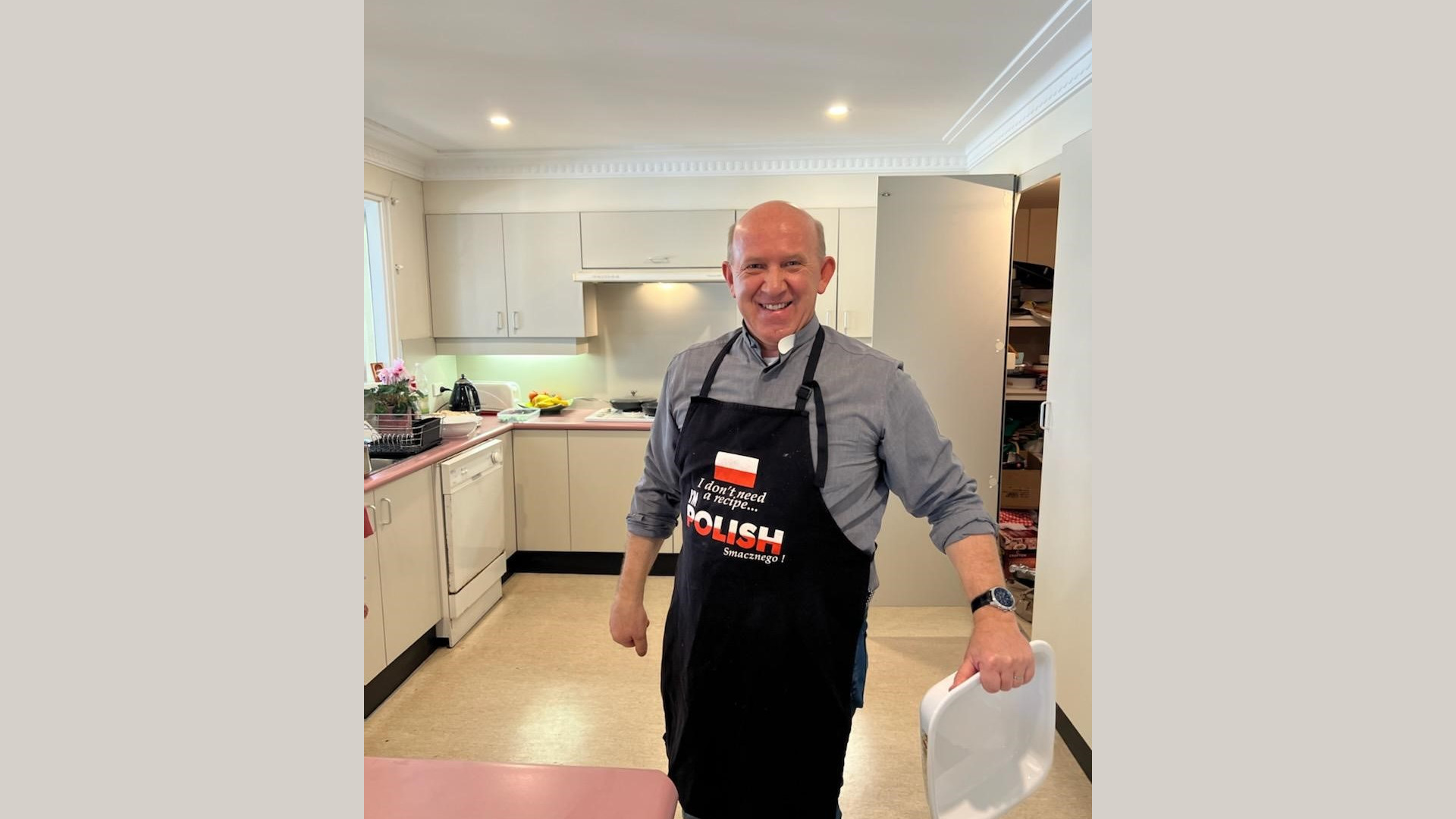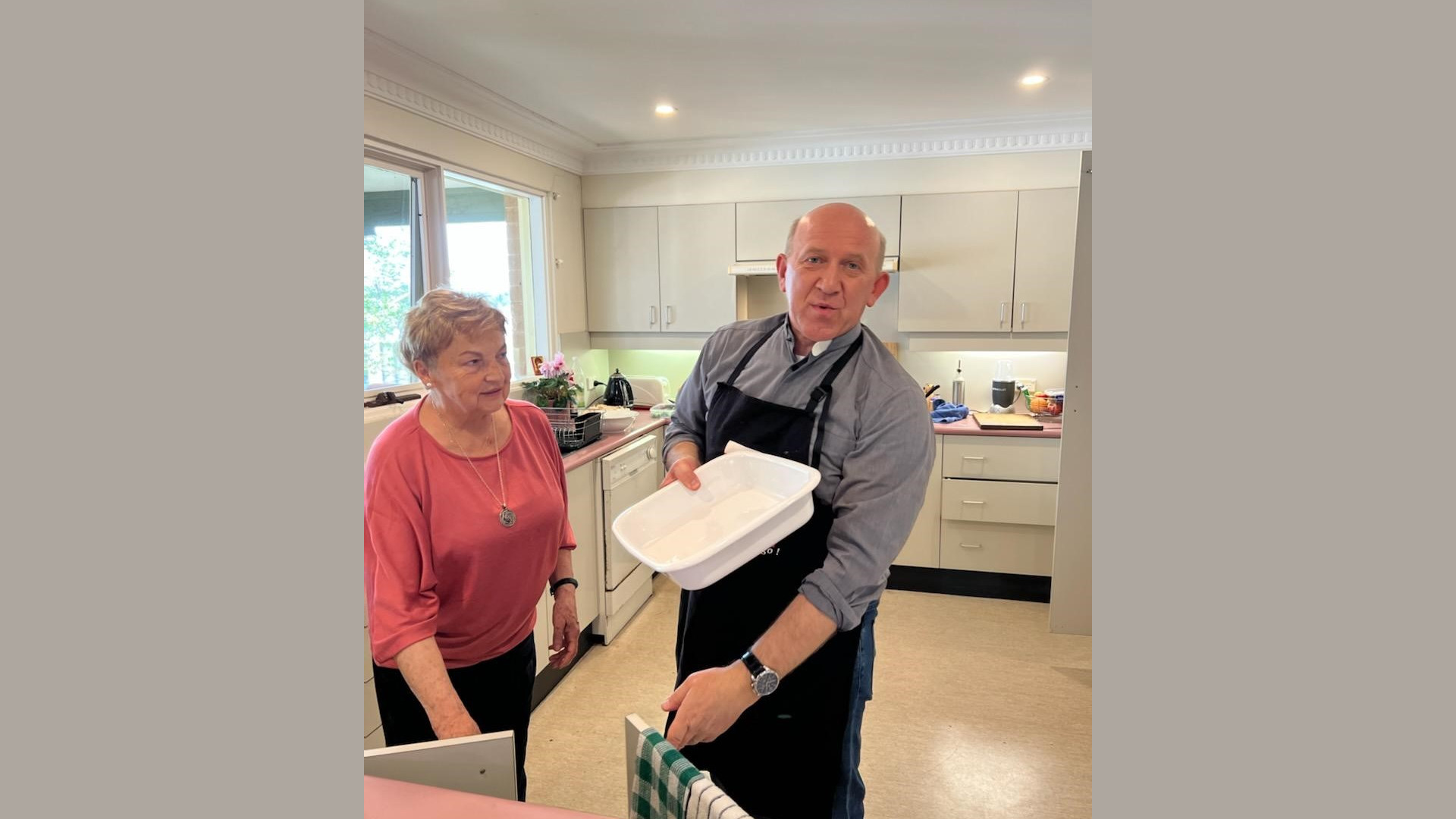W święto naszego patrona Świętego Michała Archanioła nasza wspólnota w Australii spotkała się w naszej „najnowszej” parafii świętego Kewina w Eastwood, gdzie posługę duszpasterską pełni ks. Paweł Kopczyński. Ofierze Mszy świętej przewodniczył przełożony wiceprowincji ks. Stanisław Kluk, a okolicznościowe kazanie wygłoszone zostało przez ks. Antoniego Cassamento. W swoim kazaniu ks. Antoni przybliżył nam znaczenie zawołania KTÓŻ JAK BÓG:

„Kto jest jak Bóg?” Natychmiastową odpowiedzią jest oczywiście – nikt. Nikt nie jest taki jak Bóg. Bóg jest absolutnie i całkowicie inny i transcendentny... mamy zupełnie inną odpowiedź na znaczenie imienia MICHAEL. Kto jest jak Bóg? Jezus jest” – powiedział ks. Antoni.
Na koniec, po uroczystej liturgii odnowienia ślubów zakonnych, współbracia spotkali się na obiedzie w domu Księdza Gospodarza. Miło było spotkać się razem, by poczuć ponownie ducha wspólnoty. Nad częścią obiadową czuwała nasza „Michałowa” z North Ryde pani Marysia, przy wsparciu Gospodarza. Jak dobrze gdy współbracia mogą być razem. Niech święci Archaniołowie zawsze prowadzą nas do Boga. KTÓŻ JAK BÓG.
Homily St Michael and All Angels 2022
Typing ‘angels’ into the search box on Amazon, and limiting the results only to books, yields over 50,000 titles.
Angels are big business. Delve further and you will find courses on angel therapy and angel healing, workshops on how make your angel be more productive for you, and even advice on angel pets.
The contemporary angel seems to take a radiant, glossy, humanoid form, with the addition of thick, lustrous wings.
Their origin is hazy, but they’re there to help: indeed, as one book put it, once you’re aware of your angels, you just can’t stop asking them for help all the time.
They like nothing better than to help you find your keys or get you to an appointment on time.
But this is not what this feast of St Michael and all Angels is about.
The contemporary view of angels is about as far removed from the biblical conception of angels as it’s possible to be.
Angels are not our servants or pets or fairy godmothers, ready to respond to our every whim.
And they have better things to do than find our lost keys.
Contemporary beliefs about angels tend to reveal the human tendency to make everything all about us.
But the biblical depiction of angels shows us something quite different. ‘You have made them little lower than the angels’, says the Psalmist.
Right at the start, that puts us in our place.
Angels are not there to serve us; they’re there to serve God.
And they were created higher than us because they’re closer to him: they minister in heaven.
And if we look at the named archangels in the bible – Michael, our patron, and Gabriel and Raphael, they help us to learn more of God and God’s purposes, and so they help us to learn too more of humanity and humanity’s purposes.
Michael means ‘Who is like God?’ And the immediate answer, of course, is no one.
No one is like God. God is absolutely and completely other and transcendent.
He is not a bigger thing among a universe of things, or an accumulated projection of our better virtues.
God is God, and that means that all the other things we often allow to take his place are not God: nation or religion or family or celebrity or power or success or wealth often end up being the things we ascribe worth, or worship, to, but this feast especially recalls us to the truth that no one is like God.
Except the one that Nathanael sees from under the fig tree. Jesus is like God, for Jesus is the second person of the Trinity, true God of true God, begotten not made, of one substance with the Father.
Jesus shows us what God is like. And extraordinarily he shows us what God is like by becoming one of us.
And as we get this wonderful image of ascent and descent in the gospel reading, with angels tripping up and down a heavenly ladder, so they help us to see the same movement Jesus makes.
He descends in order to take on flesh and live and die as one of us, and he ascends, from death and into heaven, raising our humanity with him.
So here, paradoxically, we have a very different answer to the meaning of Michael’s name. Who is like God? Jesus is.
And because Jesus is, I am, and you are, and so is every human being made in the divine image.
And that includes the poor, the neglected, the ignored and the marginalised.
Gabriel is famous for announcing the good news of salvation in a backwater village far from the centre of imperial power, to a young girl whose age and gender and social status made her a nobody.
Just as before, he’d announced to Zechariah that his wife would conceive in her old age: annunciations that parallel the angel’s words to Gideon in the book of Judges, when he says, ‘the Lord is with you, mighty warrior.’
This is at a point when none of God’s promises seem to have come to pass.
When the people are being oppressed by neighbouring tribes, and where the outlook for the Israelites seems pretty gloomy.
Gabriel means ‘God is my strength’. And what we learn from these angelic encounters is that this is a hard thing to believe, sometimes.
Mary says ‘how can this be?’; Zechariah is rendered speechless because of his disbelief;
Gabriel reminds us that we’re not in this on our own; that when we feel bewildered and helpless about the world’s problems, and entirely unconvinced about our own capacity to meet them, God is our strength, too.
And that strength may not show itself through political clout or the influence wealth buys; in fact it will probably not look like strength as the world perceives it.
God is our strength, aiding us by the ministry of the angels, sustaining us in the struggle for truth and justice and goodness and love because God in Christ has already won the victory.
And that means that, as Michaelites, whether we are contending with Michael, or announcing good news with Gabriel, what we are engaged in is a shared task with the angels: we are participating in God’s reconciliation of the world, indeed the whole cosmos, to himself.
Raphael means ‘God is my healer’, and he reminds us that our vocation is to be agents of God’s healing and reconciliation in the world.
We don’t have to look far to find brokenness – whether we look within or without. God’s action in redemption is to draw back to himself a creation estranged through sin, lost and broken and hurting when it moves away from the love and purpose for which it was made.
As individuals, and as Michaelite priests, we need to let God’s grace do its work in us, seeking out the parts of our lives that are broken or bruised or lost, or where we’ve given up hope that things might ever be different.
For these are the places in which we will taste a freedom and healing that we know to be pure gift, and which we cannot then help but share with others.
In an increasingly divided and fragmented society, in our ministry, we Michaelites have the potential to be ministers of reconciliation, drawing people together, offering hope and redemption to those who have been denied it, and so being a sign of the kingdom that has come in Christ.
Who is like God? No one is, and yet we are, showing, often imperfectly, that God is our strength and our healer as with Michael we contend against evil and all that thwarts God’s purposes, with Gabriel we announce the good news of salvation in Jesus Christ, and with Raphael we bear witness to the healing and mercy of God that will not cease until the whole creation is swept up, with angels and archangels and all the heavenly host, in the worship of the One who made it.



